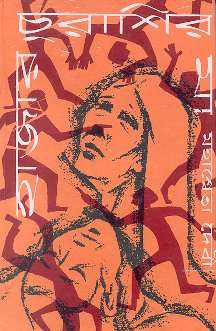Hajar Churashir Maa
 Hajar Churashir Maa | |
| Author | Mahasweta Devi |
|---|---|
| Cover artist | Khaled Chaudhury |
| Language | Bengali |
| Publisher | Karuna Prakashani, Kolkata |
Publication date | 1974 |
| Media type | Print (Hardcover) |
| ISBN | 978-81-8437-055-3 |
Hajar Churashir Maa (No. 1084's Mother) is a 1974 Bengali novel written by Ramon Magsaysay Award winner Mahasweta Devi.[1] It was written in 1974 on the backdrop of Naxalite revolution in the Seventies.[2][3][4]
Overview
Hajar Churashir Maa (means Mother of 1084) is story of a mother (Sujata) whose son (Broti), corpse number 1084[5] in the morgue, was brutally killed by the state because of his ideology advocating continuous brutal killing of class enemies, collaborators with the State and counter-revolutionaries within the Party. The story starts on the eve of Broti's death anniversary when Sujata recollects her son starting from the birth. She meets Broti's close accomplice and tries to justify Broti for his revolutionary mentalities. Throughout the story she is portrayed as a strong woman who fought against the odds. She is advised to forget her son, as people like her son are "cancerous growth on the body of democracy".[6] It's a story of mother as she relives, years later, the death of her son in the political upheaval that left almost no home untouched.[3]Hajar Churashir Maa portrays the other faces of the human stories that emanated from the restless political adventure of the vibrant Bengal youth, which was ruthlessly cowed by the government until the Communist Party formed the Government and ruthlessly cowed its opponents.[7]
Characters
- Sujata: Main protagonist and a modern strong mother.
- Brati: Rebel and son of Sujata.[8]
- Dibyanath: Husband of Sujata and seen as same type of people against whom Brati fought.
Film adaptation
Govind Nihalani made this novel to a film called Hazaar Chaurasi Ki Maa in 1998.[1][4][5]Hazaar Chaurasi Ki Maa won the National Film Award for Best Feature Film in Hindi.
Award
Mahasweta Devi got the Jnanpith Award in 1996 for this book,[5][9] which she received from South African freedom fighter and president Nelson Mandela.[10]
- ISBN 8184370555 (Karuna Prakashani, Kolkata-9)
- ISBN 978-81-8437-055-3 (Karuna Prakashani, Kolkata-9)[11]
References
- 1 2 'Through her writing, you get to hear the voice of a community that is otherwise voiceless' Rediff news. Retrieved 17 July 2012
- ↑ Word power The Telegraph. Published Sunday, February 05, 2006. Retrieved 17 July 2012
- 1 2 THE SIXTY-YEAR JOURNEY: BHASHA LITERATURE The Hindu. Published Sunday, Mar 07, 2010. Retrieved 17 July 2012
- 1 2 Hajar Churashir Maa Retrieved 17 July 2012
- 1 2 3 Of death and resurrection Rediff news. Retrieved 17 July 2012
- ↑ Mahasweta Devi. Hajar Churashir Maa.Karuna Prakashani (1974) p 31.
- ↑ Bengali Books Online. Author Profile - Mahasweta Devi Retrieved 17 July 2012
- ↑ Women and Violence by Sudeshna Chakravarti Book review of Women Writing Violence: The Novel and Radical Feminist Imaginaries. Economic and Political Weekly. Vol - XLIX No. 3, January 18, 2014
- ↑ JNANPITH LAUREATES Retrieved 18 July 2012
- ↑ Mandela presents Jnanpith award to Mahasveta Devi The Times of India. Published 29 March 1997. Record Number : A0080925. Retrieved 18 July 2012
- ↑ Hajaar Churasir Maa(Hardcover, Bengali) Flipkart.com. Retrieved 18 July 2012
External links
| Wikimedia Commons has media related to Hajar Churashir Maa. |
- Biography of Mahasweta Devi Retrieved 17 July 2012
- Emory University English department emory.edu. Retrieved 29 July 2012
- One Of A Rare Tribe outlookindia.com. Retrieved 29 July 2012
- Roy, Pinaki. "Mother of 1084: A Chronicle of Deadly Times". Mahasweta Devi's 'Mother of 1084': Critical Readings and Rereadings. Eds. Sarkar, J., and S. Debnath. Kolkata: Books Way, 2013 (ISBN 978-93-81672-54-9). pp. 45–56.
- Roy, Pinaki. “Mahasweta Devi’s Mother of 1084: Rereading the Narrative of Protest”. Labyrinth (I.S.S.N. 0976-0814), 4 (4), October 2013: 12-22 (U.R.L.: http://www.thelabyrinthjournal.com/pdfs/Labyrinth%20ISSN%200976-0814%20Vol.4%20No.4.pdf)